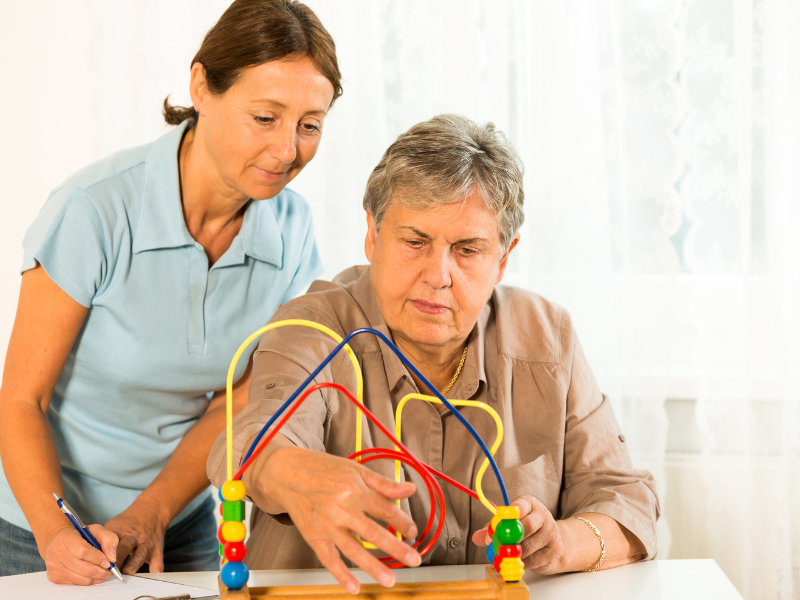One of the caregivers on our team assists an elderly gentleman who was released from the hospital after a serious urinary tract infection that spread to his bloodstream. The man’s healthcare team recommended physical therapy and occupational therapy for the man to regain his strength and independence once he returned home.
The physical therapist began treating the man, and he did respond favorably after six visits and a series of exercises. The caregiver inquired about the occupational therapy the man in her care was supposed to receive, and she learned that the occupational therapists on staff were months behind schedule.
The man’s daughter asked the caregiver why occupational therapy (OT) was so important and how it could help her Dad. The caregiver replied with a general answer, but she turned to me for more information.
That’s when I decided to outline the top five benefits of occupational therapy for seniors so the caregiver, her client, his daughter, and others would understand more about the importance of occupational therapy.
What is Occupational Therapy?
The American Occupational Therapy Association explains, “Occupational therapy intervention uses everyday life activities (occupations) to promote health, well-being, and your ability to participate in the important activities in your life. This includes any meaningful activity that a person wants to accomplish, including taking care of yourself and your family, working, volunteering, going to school, among many others.”
An occupational therapist will conduct a thorough evaluation and assessment to learn more about the senior’s history, life experiences, and general interests to create an occupational profile. This provides them with a measure of the senior’s values and the activities that are most important to them.
With this profile, the occupational therapist will create an intervention plan that is tailored specifically to the senior’s needs to improve their performance of these activities and reach specific goals.
Benefits of Occupational Therapy for Seniors
Jonathan Trout with Consumer Affairs said, “In every stage of life, occupational therapy helps people develop, recover or maintain the skills they need to do meaningful and necessary daily activities. In particular, occupational therapists can help older adults overcome daily challenges caused by diminished ranges of motion and mobility.”
The following are Trout’s top 5 benefits of occupational therapy for seniors:
- Overcome everyday challenges. Occupational therapists use education, exercise, and rehabilitation techniques to help make daily tasks like getting dressed, eating, bathing, and using the restroom easier for patients. By focusing on what they can do rather than what they can’t, occupational therapists teach patients to do daily tasks safely based on their abilities. Regular occupational therapy like working crossword puzzles, doing arts and crafts, or reading a magazine can help patients sharpen their fine and basic motor skills, keep up their strength and improve their dexterity.
- Recommend home modifications. Occupational therapists look at the home layout to get a feel for how seniors get around every day. They recommend modifications like getting a bathtub seat or grab bars to make daily activities safer. Home modifications help prevent falls and instill confidence when doing everyday tasks.
- Provide support for memory loss. Occupational therapists help patients who are experiencing dementia by measuring their strengths and weaknesses and then identifying performance areas that need work. Even though there is no cure for the disease, therapy patients often show improvement through adaptation and compensation. A therapist can teach someone with dementia to use lists and other prompts to help with recollection.
- Help with vision loss. If a senior suffers from vision loss, such as with glaucoma, an occupational therapist can work with them using activities that promote visual awareness, help them detect patterns and reinforce perceptual skills. An occupational therapist may suggest changes at home and work. Changes can include using color-coded ID tags, more lighting and contrast and aid equipment like magnifiers.
- Provide caregiver assistance. Being a primary caregiver can take physical, emotional, and financial tolls. Occupational therapists are trained to evaluate a caregiver's situation and help manage or alleviate their workload when necessary. The therapist's goal with a primary caregiver is to make sure they’re maintaining a lifestyle in which the patient’s needs are met without sacrificing their own.
The caregivers I employ at Home Helpers work in conjunction with occupational therapists and physical therapists when needed, to lend support to our senior clients in their efforts to improve their performance, reach their goals, and remain independent for as long as possible.
In addition, the caregivers on our team are highly trained to perform numerous in-home care services to assist our clients with activities of daily living and make life easier. If we can provide assistance for you or a senior loved one who has mobility issues or is under the care of an occupational or physical therapist, I offer a FREE Consultation to assess needs and create a customized care plan.
We, at Home Helpers® Clearwater, are honored to have been ranked among the Home Care Pulse Top 100 Leaders in Experience for home care providers in 2023 and to have received the Best of Home Care® Provider of Choice Award 2023, the Best of Home Care® Employer of Choice Award 2023, and the Best of Home Care® Leader in Experience Award 2023.
We proudly serve male and female seniors in Clearwater, Dunedin, Palm Harbor, Safety Harbor, Tarpon Springs, Holiday, New Port Richey, Trinity, Port Richey, Hudson, and surrounding areas. Home Helpers®…we are Making Life Easier℠ 727.942.2539
Sources:

